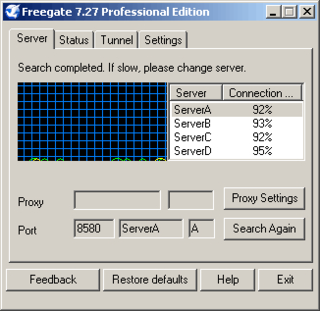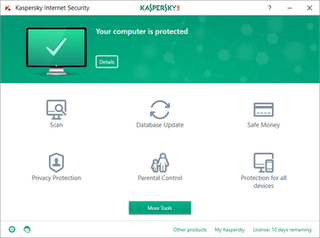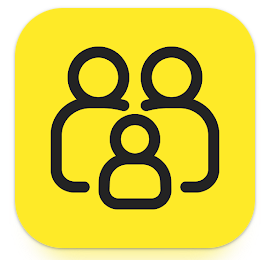
AIM was an instant messaging and presence computer program created by AOL, which used the proprietary OSCAR instant messaging protocol and the TOC protocol to allow registered users to communicate in real time.
Spyware is any software with malicious behavior that aims to gather information about a person or organization and send it to another entity in a way that harms the user by violating their privacy, endangering their device's security, or other means. This behavior may be present in malware and in legitimate software. Websites may engage in spyware behaviors like web tracking. Hardware devices may also be affected.

A personal firewall is an application which controls network traffic to and from a computer, permitting or denying communications based on a security policy. Typically it works as an application layer firewall.
Internet security is a branch of computer security. It encompasses the Internet, browser security, web site security, and network security as it applies to other applications or operating systems as a whole. Its objective is to establish rules and measures to use against attacks over the Internet. The Internet is an inherently insecure channel for information exchange, with high risk of intrusion or fraud, such as phishing, online viruses, trojans, ransomware and worms.
Norton AntiVirus is an anti-virus or anti-malware software product founded by Peter Norton, developed and distributed by Symantec since 1990 as part of its Norton family of computer security products. It uses signatures and heuristics to identify viruses. Other features included in it are e-mail spam filtering and phishing protection.
Norton Internet Security, developed by Symantec Corporation, is a discontinued computer program that provides malware protection and removal during a subscription period. It uses signatures and heuristics to identify viruses. Other features include a personal firewall, email spam filtering, and phishing protection. With the release of the 2015 line in summer 2014, Symantec officially retired Norton Internet Security after 14 years as the chief Norton product. It was superseded by Norton Security, a rechristened adaptation of the Norton 360 security suite.
Comet Cursor was a software program written by Comet Systems. It allowed users of the Microsoft Windows operating system to change the appearance of their mouse cursor and to allow websites to use customized cursors for visitors. The product installed itself without user permission and is an early example of spyware.

Zango,, formerly ePIPO, 180solutions and Hotbar, was a software company that provided users access to its partners' videos, games, tools and utilities in exchange for viewing targeted advertising placed on their computers. Zango software is listed as adware by Symantec, and is also labeled as a potentially unwanted program by McAfee. Zango was co-founded by two brothers: Keith Smith, who served as the CEO; and Ken Smith, who served as the CTO.
A LAN Messenger is an instant messaging program for computers designed for use within a single local area network (LAN).

Freegate is a software application developed by Dynamic Internet Technology (DIT) that enables internet users to view websites blocked by their governments. The program takes advantage of a range of proxy servers called Dynaweb. This allows users to bypass Internet firewalls that block web sites by using DIT's Peer-to-peer (P2P)-like proxy network system. FreeGate's anti-censorship capability is further enhanced by a new, unique encryption and compression algorithm in the versions of 6.33 and above. Dynamic Internet Technology estimates Freegate had 200,000 users in 2004. The maintainer and CEO of DIT is Bill Xia.
The Vundo Trojan is either a Trojan horse or a computer worm that is known to cause popups and advertising for rogue antispyware programs, and sporadically other misbehavior including performance degradation and denial of service with some websites including Google and Facebook. It also is used to deliver other malware to its host computers. Later versions include rootkits and ransomware.
Check Point Integrity is an endpoint security software product developed by Check Point Software Technologies. It is designed to protect personal computers and the networks they connect to from computer worms, Trojan horses, spyware, and intrusion attempts by hackers. The software aims to stop new PC threats and attacks before signature updates have been installed on the PC. The software includes.
Outpost Firewall Pro is a discontinued personal firewall developed by Agnitum.

Kaspersky Internet Security was an internet security suite developed by Kaspersky Lab compatible with Microsoft Windows and Mac OS X. Kaspersky Internet Security offers protection from malware, as well as email spam, phishing and hacking attempts, and data leaks. Kaspersky Lab Diagnostics results are distributed to relevant developers through the MIT License.

In computing, a blacklist, disallowlist, blocklist, or denylist is a basic access control mechanism that allows through all elements, except those explicitly mentioned. Those items on the list are denied access. The opposite is a whitelist, allowlist, or passlist, in which only items on the list are let through whatever gate is being used. A greylist contains items that are temporarily blocked until an additional step is performed.

Norton Family is an American cloud-based parental control service. Norton Family is aimed at "fostering communication" involving parents and their children's online activities. Computer activities are monitored by the software client, and reports are published online.

Eyeball Chat is a proprietary freeware VoIP, video telephony soft phone with multiple-protocol instant messaging for Windows PCs, developed by Chris Piche and Eyeball Networks in Vancouver, and first released in 2000. The software is free for personal use.
Browser security is the application of Internet security to web browsers in order to protect networked data and computer systems from breaches of privacy or malware. Security exploits of browsers often use JavaScript, sometimes with cross-site scripting (XSS) with a secondary payload using Adobe Flash. Security exploits can also take advantage of vulnerabilities that are commonly exploited in all browsers.

Brave is a free and open-source web browser developed by Brave Software, Inc. based on the Chromium web browser. Brave is a privacy-focused browser, which automatically blocks most advertisements and website trackers in its default settings. Users can turn on optional ads that reward them for their attention in the form of Basic Attention Tokens (BAT), which can be used as a cryptocurrency or to make payments to registered websites and content creators.
Norton 360 was an "all-in-one" security suite for the consumer market developed by Symantec. Originally released in 2006, it was discontinued in 2014; its features were carried over to its successor, Norton Security. However, in 2019, Symantec released a "NEW Norton 360", as a product replacement for Norton Security.









